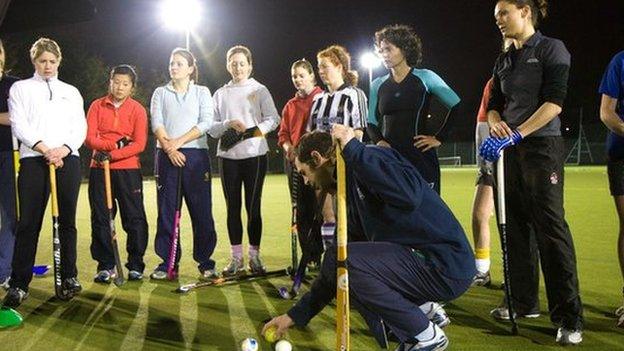Holcombe hockey: Why are England's best in the second tier?
- Published
Holcombe hockey: Why are England's best in the second tier?
Imagine Charlton Athletic signing Wayne Rooney or England rugby captain Chris Robshaw moving to Moseley.
Far-fetched it may seem, but in domestic hockey one second-tier club is splashing the cash on the country's very best players.
In 2013, England captain Barry Middleton became one of a number of internationals to drop out of the Premier Division and sign for Holcombe,, external a small club based in Rochester, Kent.
The club's spending model has drawn criticism from local rivals, but is investing in what remains a largely amateur sport a positive development or creating an unfair playing field?
Rags to riches: The Holcombe Story
In 2013, Holcombe's men's and ladies' sides were playing in the Conference East, the second tier of English hockey.
With ambitions to climb to the top of the domestic game, the club altered their spending strategy from focusing on facilities and youth to attracting the country's best players.
To achieve this, the club invested heavily, with the money coming predominantly from the club's millionaire chairman David South, founder and chairman of Faithdean, a building construction management firm that turns over just under £60m a year.
Holcombe's major signings | |
|---|---|
2013 | 2014 |
Barry Middleton (229 England apps & 58 goals; 109 GB apps & 36 goals) | Iain Lewers (65 England apps & 6 goals; 43 GB apps & 2 goals) |
Dan Fox (92 England apps & 2 goals; 31 GB apps & 1 goal) | George Pinner (68 England apps; 9 GB apps) |
Maddie Hinch (52 England apps; 5 GB apps) | Nick Caitlin (113 England apps & 10 goals; 35 GB apps & 7 goals) |
Laura Unsworth (98 England apps & 3 goals; 45 GB apps & 1 goal) | Nicola White (89 England apps & 9 goals; 42 GB apps & 1 goal) |
Lucy Wood (10 England apps; 2 GB apps) | Sam Quek (57 England apps & 2 goals; 22 GB apps) |
Steph Elliott (6 England apps; 6 GB apps & 1 goal) | |
Having been at the club for 49 years, and chairman for 37, the success of South's business has enabled him to put his own money into the club.
"We had to do something to give us a boost," he explains. "Our vision is not just the Premier Division; we aim to be a top-four club trying to get into Europe.
"We're just an unfashionable mid-Kent club. We needed some good players and a robust junior system parallel to that. You have to set your sights very high."
The 'boost' has brought instant success with the ladies achieving consecutive promotions in 2013 and 2014, narrowly missing the Premier Division play-offs in 2015.
And having spent seven years in the Conference East, the men are unbeaten this season, winning 17 of 18 league matches, scoring 110 goals and topping the table., external
They are now taking part in the Promotion Tournament play-offs with Canterbury, Bowdon and Team Bath Buccaneers, as the four clubs fight for the two spots available in the top flight.
The player's view: More than just money
So why would a bunch of England internationals drop down a division from the top clubs in England?
Several of the star signings have had to withstand accusations that their moves were motivated purely for financial gain.
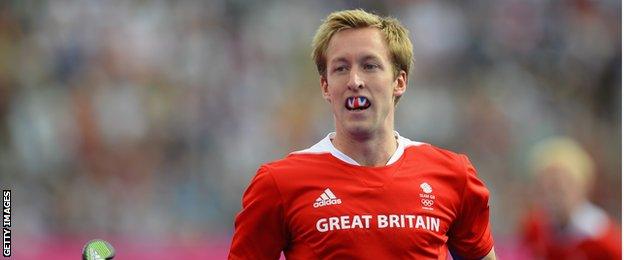
England captain Barry Middleton denies moving to Holcombe just for the money
Barry Middleton is one of the most sought after players in the world, fetching over £35,000 at the 2014 Hockey India League auction. But he denies Holcombe's chequebook was the main factor in signing.
"It was a decision based on hockey as well as everything else," explains the 31-year-old.
"We have a team that can push to go up. It was not to play in the Conference for the last 10 years of my career.
"It stopped me going to Holland or Germany, meaning I can live in England, training full-time with GB."
Can you blame the players?
Centrally-contracted internationals only earn up to £20,000 per year. Most supplement their income through sponsorship, coaching and public speaking.
"The England central contract is not enough to survive on," explains hockey journalist Rod Gilmour.
How much can an international hockey player earn? (estimated figures) | |
|---|---|
Central contract | Up to £20,000 per year |
Club contract | Between £0-£25,000 per year |
Hockey India League | Between £5,000-£40,000 |
Outside income | Up to £20,000 per year |
"They do coaching and to have this (money from Holcombe) is good for them. You can't blame the players at all.
"If the England central contracts were more, I think players would stay at Bisham Abbey, external (home to England Hockey) and find other ways to keep themselves busy."
South adds: "They have to earn a living. Without family support, if they try just to survive on their England contracts, they can't.
"We have to get money into the game. The only way that'll happen is with a few individuals and a few companies, that's the bit that isn't sustainable."
'Other clubs are becoming jealous'
Across the country, the Holcombe approach has divided opinion with some clubs happy at investment in the game but others frustrated that they cannot compete with the riches on offer.
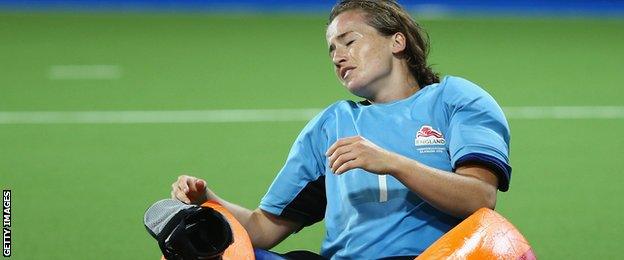
England's Maddie Hinch joined Holcombe Ladies in 2013, winning promotion the same season
"It has caused considerable friction within the hockey fraternity," continues Gilmour.
"The underlying problem is that other clubs are now becoming jealous because Holcombe have a lot of money."
One of England's most successful sides, Premier Division leaders East Grinstead, will be looking over their shoulder as Holcombe begin to climb the ladder.
They pay some players too, but admit financing a club, where even replacing a pitch costs up to £250,000, can be a struggle.
"We are all to a certain extent in a hand-to-mouth model," says East Grinstead chairman Simon Longhurst. "We have to work hard every month, every year."
When asked if the club would turn away a wealthy investor, Longhurst replied: "It would depend on who they were, what their DNA was and their core values, let's put it that way."
Outside investment: Good or bad for the sport?
For a sport that is largely amateur, even in the Premier Division, is a club willing to spend big beneficial in the long run?
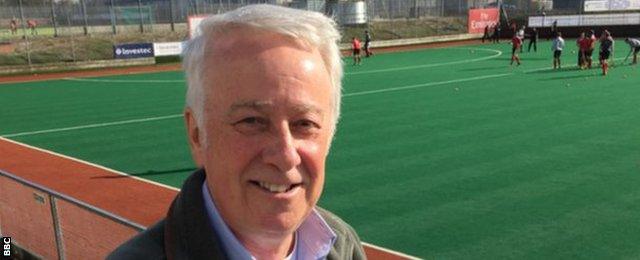
Holcombe chairman David South has invested thousands of pounds of his own money into the club
"I don't criticise Holcombe or their chairman," says England Hockey chief executive Sally Munday.
"I think the more investment we can get is good for the sport."
Gilmour argues: "The main concerns are, one, whether the Holcombe model is sustainable and, two, whether the money is going to benefit Holcombe.
"The club's sponsor is David South's company. Is that sustainable? I don't think so."
With the majority of Holcombe's investment reliant largely on a sole benefactor, a downturn in the economy could have more serious consequences for the Kent club than others.
However, South makes no apologies for the upset his investment has caused, saying he wants to return Holcombe to its community foundations in the coming years.
"It's not win or bust. It must be sustainable," he says.
"Each year, we need to drop away a paid player and replace them with our own so we get back to a sustainable proportion."
- Published3 April 2015
- Published3 April 2015
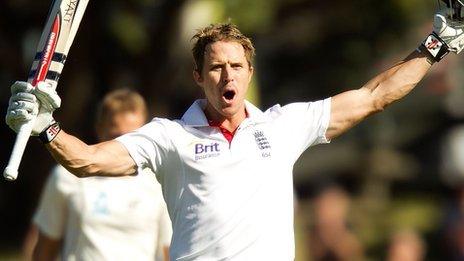
- Published12 September 2014
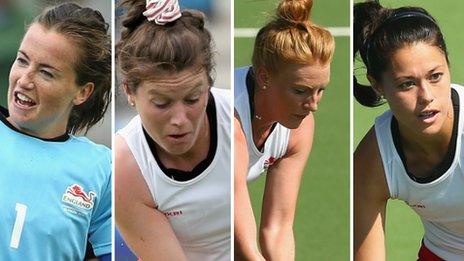
- Published10 October 2013

- Published12 November 2013
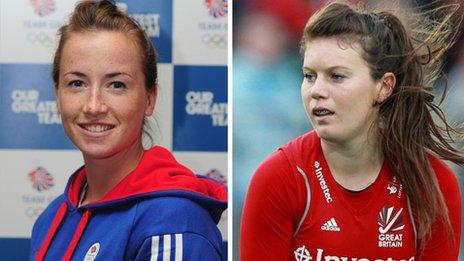
- Published12 September 2014
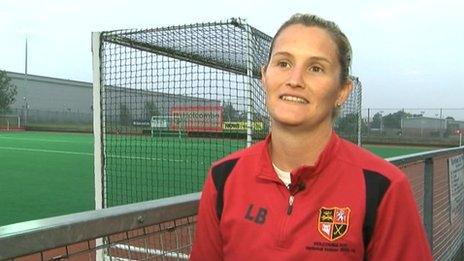
- Published14 April 2014
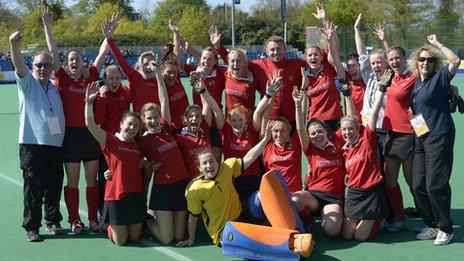
- Published3 October 2018
